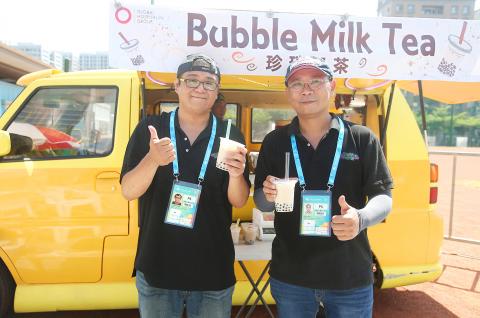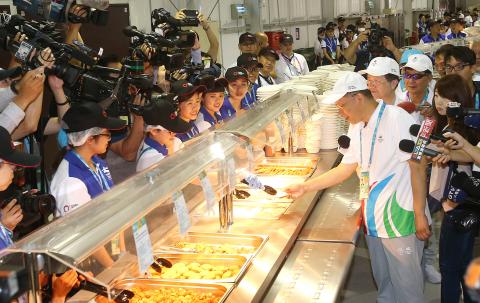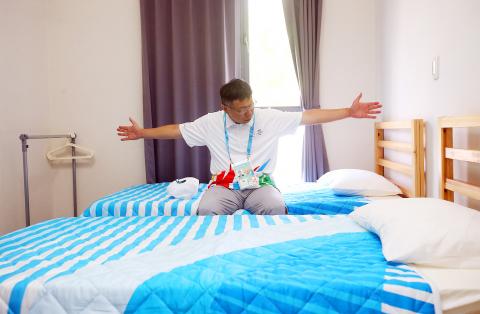The Summer Universiade Athletes’ Village in New Taipei City’s Linkou District (林口) was officially opened yesterday.
Taipei Mayor Ko Wen-je (柯文哲), International University Sports Federation president Oleg Matytsin, Taipei Universiade Organizing Committee chief executive officer Su Li-chiung (蘇麗瓊) and Athletes’ Village director Chiang Han-sun (江漢聲) attended the opening ceremony yesterday afternoon.
“Taipei is now ready to welcome the world with the best of our hospitality,” Ko said in his speech.

Photo: CNA
The village includes 34 buildings, each 12 stories to 21 stories high. Athletes’ accommodation ranging from one to four-bedroom units occupies 23 of the buildings, each of which has a rest area, a service counter and a medical room.
The village has a cafeteria that can seat up to 3,500 people, is to run 20 hours per day and should serve an estimated 35,000 to 40,000 meals daily featuring different cuisines from around the world.
Commercial services, such as dry cleaners, beauty salons, flower shops, banks, a post office and an official souvenir shop are also included.

Photo: CNA
A central security command center has been set up in the village and more than 500 officers have been stationed there, Taipei Special Police Corps deputy chief Lin Chun-yi (林浚奕) said, adding that they are to conduct patrols around the clock to keep the athletes safe.
A 3m-high fence around the perimeter of the village is to channel all people entering and leaving the area through restricted checkpoints at designated entrances, Lin said.
To enter the village, athletes must wear their identification badges, which are to be checked by card readers, he said, adding that their belongings are to also be checked by an X-ray machine.

Photo: CNA
Athletes must also pass through a metal detector door and may be scanned with a handheld metal detector if necessary, Lin said.
Any cars entering the village are to be checked with metal detectors and under-vehicle explosive scanners, he added.
During Ko’s visit, he lay down on a bed in a three-bedroom unit to test its comfort level, drank a cup of bubble milk tea and ate a few Taiwanese snacks from the cafeteria.
The bedroom unit was nice, especially the air-conditioning, Ko said, adding that he thinks the scale and quality of the village, especially the cafeteria, were better than the village in South Korea’s Gwangju he had visited.
Responding to questions about not being able to play the national anthem or raise the national flag during the opening ceremony, he said: “The city government has done the best it could, but the [Chinese Taipei Universiade] flag and the [national flag] anthem were registered with the application to hold the games.”
The city government must conform to the Agreement Between the International Olympic Committee, Lausanne and the Chinese Taipei Olympic Committee, Taipei, Ko said.
Responding to questions about why he said “Taiwan” rather than “Chinese Taipei” in his opening speech yesterday, Ko said: “We are Taiwan. Otherwise, who are we?”
The Summer Universiade is to be held from Saturday to Aug. 30. More than 7,639 athletes are expected to compete.
Additional reporting by CNA

SHIPS, TRAINS AND AUTOMOBILES: The ministry has announced changes to varied transportation industries taking effect soon, with a number of effects for passengers Beginning next month, the post office is canceling signature upon delivery and written inquiry services for international registered small packets in accordance with the new policy of the Universal Postal Union, the Ministry of Transportation and Communications said yesterday. The new policy does not apply to packets that are to be delivered to China, the ministry said. Senders of international registered small packets would receive a NT$10 rebate on postage if the packets are sent from Jan. 1 to March 31, it added. The ministry said that three other policies are also scheduled to take effect next month. International cruise ship operators

HORROR STORIES: One victim recounted not realizing they had been stabbed and seeing people bleeding, while another recalled breaking down in tears after fleeing A man on Friday died after he tried to fight the knife-wielding suspect who went on a stabbing spree near two of Taipei’s busiest metro stations, Taipei Mayor Chiang Wan-an (蔣萬安) said. The 57-year-old man, identified by his family name, Yu (余), encountered the suspect at Exit M7 of Taipei Main Station and immediately tried to stop him, but was fatally wounded and later died, Chiang said, calling the incident “heartbreaking.” Yu’s family would receive at least NT$5 million (US$158,584) in compensation through the Taipei Rapid Transit Corp’s (TRTC) insurance coverage, he said after convening an emergency security response meeting yesterday morning. National

PLANNED: The suspect visited the crime scene before the killings, seeking information on how to access the roof, and had extensively researched a 2014 stabbing incident The suspect in a stabbing attack that killed three people and injured 11 in Taipei on Friday had planned the assault and set fires at other locations earlier in the day, law enforcement officials said yesterday. National Police Agency (NPA) Director-General Chang Jung-hsin (張榮興) said the suspect, a 27-year-old man named Chang Wen (張文), began the attacks at 3:40pm, first setting off smoke bombs on a road, damaging cars and motorbikes. Earlier, Chang Wen set fire to a rental room where he was staying on Gongyuan Road in Zhongzheng District (中正), Chang Jung-hsin said. The suspect later threw smoke grenades near two exits

The Forestry and Nature Conservation Agency yesterday launched a gift box to market honey “certified by a Formosan black bear” in appreciation of a beekeeper’s amicable interaction with a honey-thieving bear. Beekeeper Chih Ming-chen (池明鎮) in January inspected his bee farm in Hualien County’s Jhuosi Township (卓溪) and found that more than 20 beehives had been destroyed and many hives were eaten, with bear droppings and paw prints near the destroyed hives, the agency said. Chih returned to the farm to move the remaining beehives away that evening when he encountered a Formosan black bear only 20m away, the agency said. The bear